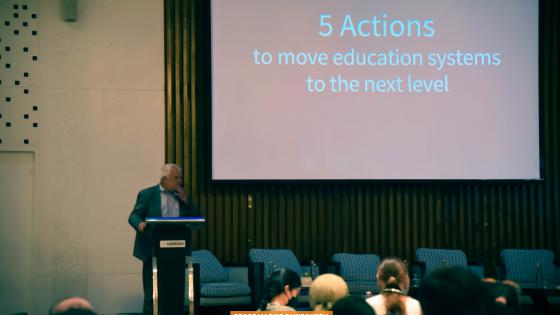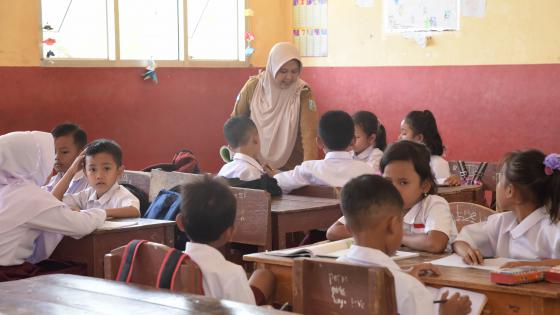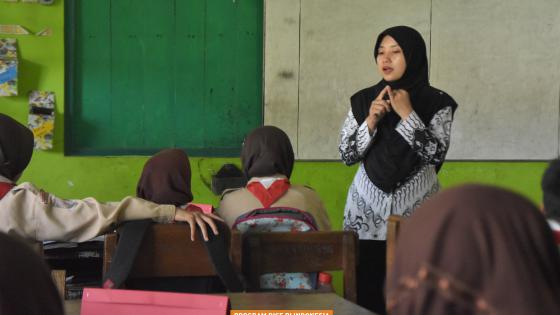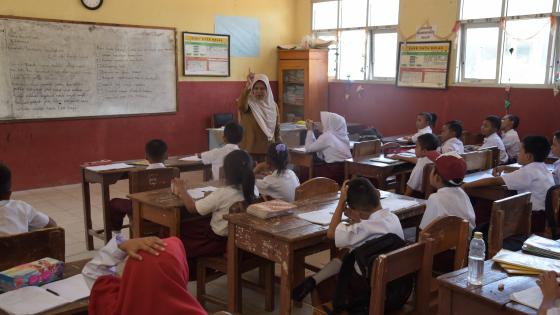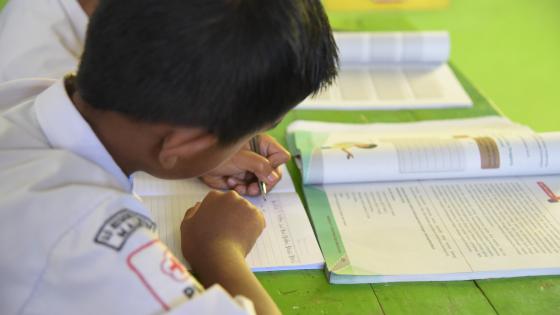Photo illustration: Novita Eka Syaputri
This article is part of the Teachers' Notes series on "What the beginning teachers would change if given the opportunity to transform regulations or policies in the field of education".
Since I first became a teacher in 2016, until now 2020, education policies in Indonesia have been through several changes. Some policies that I think should be frowned upon are the national exam, the mandatory lesson plan, and the pay difference between civil servant teachers and contract teachers.
National Exam's Effects on Teachers
As we know, in previous years, schools from primary to senior secondary levels, held the national exam. The materials were often very dense and tended to focus only on the mastery of cognitive aspects while learning in school covers cognitive, affective, and psychomotor.
The national exam was unable to assess student’s competency comprehensively. Regrettably, the national exam was an indicator to gauge a student's success, so it became a particular burden for teachers, students, and parents. The national exam made teachers focus only on the cognitive aspect to make students work on the test well. Students in Grade 6 were given try-outs and more learning hours.
During the first and second semesters in the 2019/2020 school year, the school where I worked held try-outs and additional learning hours—the national exam policy was still in force. It became a problem when the School Operational Assistance (BOS) fund was enough only for a couple of try-outs and additional learning hours, but the parents wanted more.
The school ended up holding more intensive try-outs and additional learning hours to please the parents. The parents were indeed happy, but the activities burdened Grade 6 teachers because they had to clock in more hours and did not receive additional appreciation from the school. Most of the Grade 6 teachers in my school were contract teachers.
Lesson Plan, a Teacher's Burden
I thought being a teacher was easy. After going to university, attended the teacher professional education programme (PPG), and took a teaching job at a school, I realised being a teacher was never easy. Teachers are burdened with many administrative tasks, including making a complicated and rigid lesson plan.
Making a lesson plan takes a lot of time. One document would take more than 20 pages! The time wasted on creating a lesson plan should be used to prepare and evaluate the learning process. Teachers can only make good lessons plan if they have good time management skills and are technology savvy. However, not every teacher can do so.
The Freedom to Learn Policy
On December 11, 2019, the Freedom to Learn policy was launched. It focuses on the national exam and lesson plan, which I support because it aims to solve the existing education problem in Indonesia. In this policy, the national exam is transformed into the minimum competency assessment and character survey. The lesson plan is also changed and now only requires one page.
Education in Indonesia is currently in a transition period in implementing this policy. The school where I work has yet to provide a detailed explanation on how to apply this policy. I hope there will be information dissemination soon so that the policy can be immediately applied with precision in schools.
The Teacher's Appreciation Gap
Another thing about education in Indonesia that has become my concern is the government's appreciation of teachers. There is a sizable gap between civil servant teachers' wages and contract teachers’. Most of the contract teachers receive low pay while doing the same job as the civil servant teachers.
Recently, a policy change allows at least 30% to half of the BOS fund to be used to pay the contract teachers, from previously 15%. Despite the change, however, the policy has not shown a significant impact. I know for a fact that the pay for contract teachers around me remains less than 1 million rupiahs (roughly $70) per month. This amount is still far below a civil servant teacher's salary or even the regional minimum wage requirement of the school where I teach in Bandung District.
With more universities opening teacher education majors, especially for primary school teachers, its graduates are piling up. Schools have been forbidden to hire contract teachers, but it remains unavoidable as many schools still face a shortage of teachers. Consequently, many contract teachers fill the vacancies of civil servant teachers, but with a significant pay gap between them.
Thankfully, the government opens a civil servant enrolment test this year for teachers. My colleagues and I enrol with all our might and pray, but the quota is limited and cannot to capture all teacher major graduates across Indonesia.
Besides the civil servant enrolment, there is also an opening to contract-based government employees (PPPK) for contract teachers, but only for those not paid by the state budget (K2).
I hope the government, especially the government of Bandung District, can provide better welfare for contract teachers within its area. Welfare would improve a teacher's quality. If the government understands that education is the centre of shaping the nation's future, then all areas should make a sizable investment in education.
*This Note was written by RO, a primary school teacher in West Java.
**All articles published in the Teachers' Notes are the views of the authors. They have been edited for popular writing purposes and do not represent the views of RISE Programme in Indonesia or RISE's funders.

